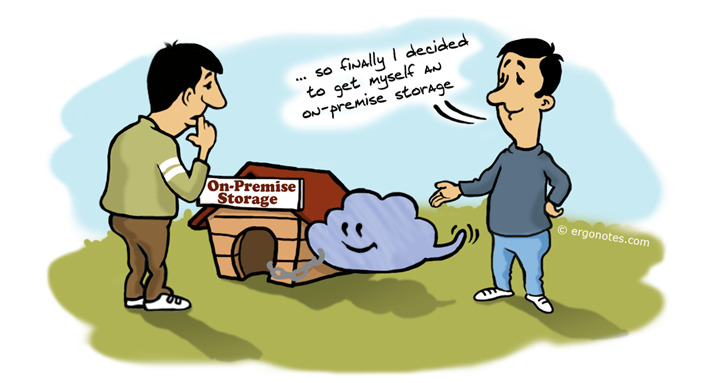On-premise storage is the self-hosted and user-managed cloud solution in which the user creates his own online storage distribution system. In this process, people use their own hosting server/data center to store files and share them.
There are several software solutions for building on-premise cloud service. Some of them are OwnCloud, Pydio, SparkleShare, SeaFile etc.
Cloud-based file sharing and storage services are gaining increasing attention from consumers and enterprises. At the same time, commercial cloud services are acquiring risk as far as privacy and security are concerned. Your data are stored on their servers- but you don’t know where they are located. The cloud companies say they encrypt your files to ensure privacy, but are you able to manage the encryption key in all of the cases? Probably not. So, if your decryption key resides in others’ hands, how can you be assured of its safety?
It’s not a secret that web services are exposed to the risk of hacking and other cyber-attacks. Remember the recent iCloud disaster that leaked hundreds of celebrity selfies? Also note that, several hundreds of Dropbox usernames and passwords were leaked online a few weeks ago. And it was not for the first time with a cloud service. So tension keeps arising.
Again, online storage companies have many clients from the different parts of the world. All of their data are stored and co-mingled in the vendor’s data centers. The cloud provider often integrates third party applications in order to achieve extra features e.g. single sign on (SSO) and so on. In this case, the system shares sensitive information like passwords. A successful breach into these apps could void the defense of the file distribution system.
Regulatory compliance is another issue to take into account. In some cases, data from a specific country may be illegal to store in another country. On premise storage could solve this problem with its storage management. It is also capable of providing the exact controlling features you want. Suppose, you might need to specify some accessibility filters for your files, for example, that these can only be accessed from a few predetermined countries. Or, more precisely, that the data can only be read from your company VPN. Such advanced options may not be available on traditional cloud services. But in the on-premise storage mechanism, you are free to define those conditions and apply them on your file sharing system.
On-premise storage service solutions offer integration with mobile and desktop platforms so the data stay synchronized among whichever multiple devices as you need.
The ‘Going concern’ principle may not always work with every cloud storage company we see today. Online storage vendors can be acquired by others or they might face distress and thus go offline. They also may raise storage prices, change business strategy and so on. If these decisions go against your company’s interest, what can you do? Even if you decide to switch the provider, that is not always so easy accomplish. Switching requires time and cost. What will happen with your sensitive data stored on the departing cloud server? Will the vendor completely remove them to ensure your privacy? How flexible will they be in this case? There are so many questions like this. So, be careful.
On-premise storage is capable of easily solving the above stream of concerns easily with self-hosted cloud structure. Here you can encrypt your own data and hold the encryption key. No third party can access files. It provides a great opportunity to control and govern your contents. That’s why more and more entities are thinking about this way of storing and sharing contents.

